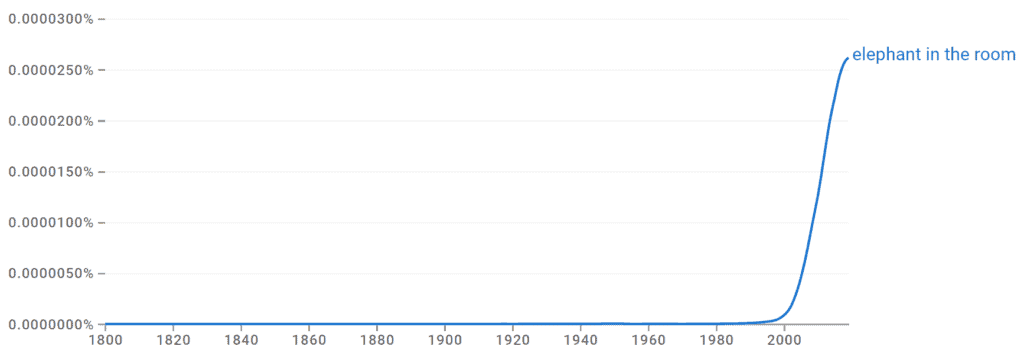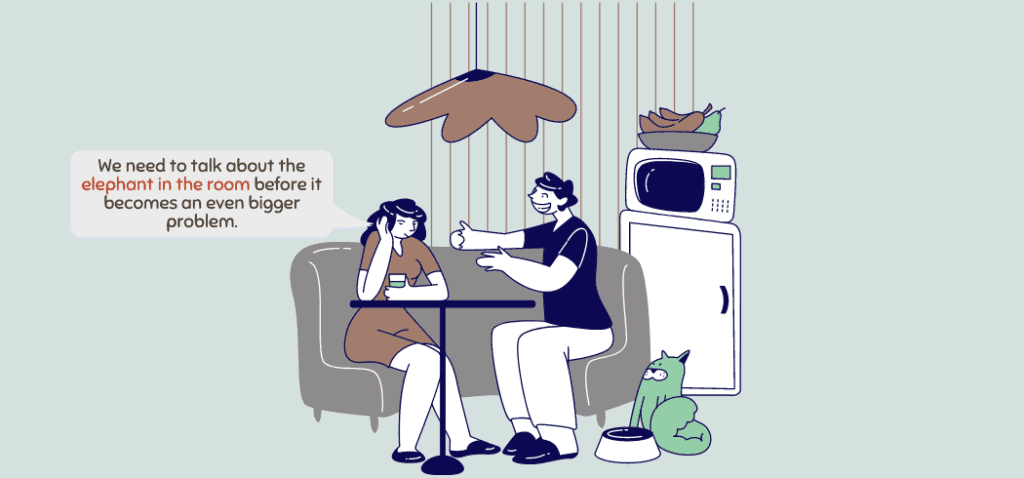Hey! Let’s talk about that elephant in the room. Wait, what does that even mean? This common idiomatic phrase is often used in casual conversation, but you might not know its actual meaning or where it originated from. So, sit tight as I explain everything about this kooky phrase and how you should be using it.
What Does Elephant in the Room Mean?
We all use the phrase “elephant in the room” to describe a situation or an issue that’s pretty obvious or noticeable, but it’s not being addressed or discussed the way it should be. Like when you know two friends in your friend’s group are fighting but are super quiet when among everyone. You could stand up and say, “Alright, let’s address the elephant in the room.”
Is Elephant in the Room an Idiom?
You bet! When you hear “elephant in the room,” you can be sure it’s considered an English idiom or idiomatic phrase because it’s not a true statement; there’s no actual giant elephant standing in the room.
What’s the Meaning of White Elephant in the Room?
“White elephant in the room” is a variation of the normal phrase most of us use. A “white elephant” is considered a rare and valuable gift in some cultures, but eventually, over many years, the term came to represent something difficult to get rid of or take care of.
What’s the Origin of the Phrase Elephant in the Room?
You’d think the roots of this phrase went back quite far, but it first appeared in America during the early 1950s in an excerpt in the Charleston Gazette that said, “Chicago, that’s an old Indian word meaning get that elephant out of your room.”
It was also reworded and used in the title of the book by Typpo and Hastings, “An Elephant in the Living Room,” which is a book about children of alcoholics published in 1984.
But before the phrase hit the US, it was used in 1814 by Ivan Krylov, a Russian poet and fabulist. He wrote a little fable called “The Inquisitive Man,” which talks about the story of a man who goes to a museum and notices all sorts of tiny things but fails to notice an elephant in the room.
Elephant in the Room Synonyms
- Taboo topic
- Unspoken issue
- Delicate matter
- Skeleton in the closet
Examples of Using the Phrase Elephant in the Room in a Sentence
- The company’s financial problems were the elephant in the room that nobody wanted to acknowledge, but we had to address them to move forward with a new plan.
- With my mother planning to visit, my husband and I had to talk about the elephant in the room; she’s extremely rude, and everyone lets her get away with it.
- Despite the tension between my two best friends, the elephant in the room remained unaddressed, and now our group trip to Mexico is going to be awkward.
- Listen, we need to talk about the elephant in the room before it becomes an even bigger problem. I think we should see a couple’s therapist.
No More Elephant in the Room
Whether you call it an “elephant in the room” or a “white elephant in the room,” the meaning is pretty much the same. At least, the intent is. It represents a problem or issue causing discomfort or difficulty that needs to be addressed but is probably ignored because no one wants to deal with it.
Check out some of our articles about idioms:



